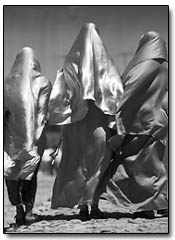|
It all began at the pyramids.
Nearly 40 years ago, my dad was enjoying a brief military
career in the French Alps. From what I can tell, his duties
consisted mainly of skiing, drinking wine and cruising
Europe on a beat-up motorcycle. During one trip away from
the military hospital, he managed to stray as far as Egypt
and paid a visit to the Valley of the Kings. On a morning
when other U.S. Army privates were getting their first
tastes of Vietnam, he climbed to the top of the Great
Pyramid and took in the sunrise. Afterward he descended
the structure and entered deep into the Pharaoh Khufu’s
subterranean tomb. 
Nearly 20 years ago, my dad described it all to me in
technicolor. I specifically recall the trip inside the
tomb. He related the feeling that its walls were breathing
with the pulse of energy as he sat all alone, hundreds
of feet beneath that giant geometric structure.
That was all I needed. I was hooked, and not only on
pyramids. The whole of the Middle East became one of my
leading interests. However, Arab culture was a little
sparse in San Miguel County. Consequently, I started reading
everything I could get my hands on, and through pages,
I explored the age of the pharaohs, spent time in the
Bedouin culture of the Blue Men of the Sahara, read the
love poetry of the mystic Rumi, and circumambulated the
Kaaba in Mecca and set eyes on the mythic Black Stone.
My first year of college found me enrolled in courses
like Arabic 101, the Geopolitics of North Africa and Islamic
Mysticism. More importantly, it gave me my first direct
exposure to the real culture, my first exposure to Arabs.
A boy my age named Jalaluddin Malik lived down the hall
in my dorm. A first generation Syrian-American, he’d
chosen to avoid the drug- and alcohol-induced college
path I was on. Devoutly Muslim, everything about his day-to-day
routine was impeccable, from his posture to the humble,
bowed salutation with which he greeted everyone.
Born in Jordan, Mohammed Sawaie was almost cherubic in
his collegiate khakis and oxford. Bald and graying, the
nearly 60-year-old man virtually bounced around the campus,
smiling at every turn. His countenance changed inside
the Arabic classroom, however. Frequently, I faced his
gritted teeth after slipping a word of Spanish in between
my guttural Arabic. Following class, the cherub always
returned.
Also an older man, Abdulaziz Sachedina took a nap in
his office every day between 2:20 and 3 p.m. He was one
of those rare figures that seemed haloed with light, always
smiling and taking those around him into the glow. A professor
of religion, he’d spent time studying with the Ayatollah
Khomeini and lived in Iraq en route to London and eventually
America.
Pointing to himself, he once said: “Atheists say
that miracles don’t happen. But how could this boy
who once nearly starved in the streets of Tanzania, find
his way to Europe and America and become a teacher of
higher learning?”
There was Attiyah, the Arab janitor who also was busy
solving the philosophic riddles of the universe between
sweeps of the broom, and there were dozens of others,
people with names like Waddah al-Khatib, Carine Saddy
and Miriam Nowroozi. They came from Pakistan, Afghanistan,
Iran, Turkey, Algeria and yes, Iraq.
During a summer trip, I saw the source firsthand. Hundreds
of miles from Mecca but just north of the Iraq and Iran
border, the former Soviet republic of Azerbaijan is very
much the Arab Middle East. Like my Arab-American friends,
the people at the source were among the most compassionate
and dignified I’ve met anywhere. After this trip,
four years in the Arabic classroom, a major in Middle
Eastern studies and a year spent working at the Middle
East Institute, I have yet to meet the so-called “evil-doers.”
A couple weeks ago, a conversation turned to warfare
in the Middle East and Afghanistan. “I’ve
spent a lot of time in these places,” I was told.
“These aren’t just numbers for me. These are
names and faces.”
As the “Operation Iraqi Freedom” and the
“Shock and Awe” campaign come to us over our
television screens, we can remember that this is not a
video game or a sporting event. Arabs are not universally
evil. They are not nameless “towel-heads”
or people wielding curved swords and drinking the blood
of Christians. Contrary to reports, they are no less human
than taxpaying Americans.
There are names, faces and families on both sides of
the battlefield.
-Will Sands
|

